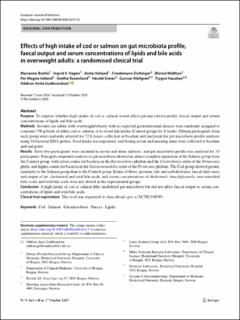| dc.contributor.author | Bratlie, Marianne | |
| dc.contributor.author | Hagen, Ingrid Valheim | |
| dc.contributor.author | Helland, Anita | |
| dc.contributor.author | Erchinger, Friedemann Georg | |
| dc.contributor.author | Midttun, Øivind | |
| dc.contributor.author | Ueland, Per Magne | |
| dc.contributor.author | Rosenlund, Grethe | |
| dc.contributor.author | Sveier, Harald | |
| dc.contributor.author | Mellgren, Gunnar | |
| dc.contributor.author | Hausken, Trygve | |
| dc.contributor.author | Gudbrandsen, Oddrun Anita | |
| dc.date.accessioned | 2021-02-16T11:06:55Z | |
| dc.date.available | 2021-02-16T11:06:55Z | |
| dc.date.created | 2020-11-08T13:34:55Z | |
| dc.date.issued | 2020-10-27 | |
| dc.Published | European Journal of Nutrition. 2020, 1-18. | |
| dc.identifier.issn | 1436-6207 | |
| dc.identifier.uri | https://hdl.handle.net/11250/2728332 | |
| dc.description.abstract | Purpose
To explore whether high intake of cod or salmon would affect gut microbiota profile, faecal output and serum concentrations of lipids and bile acids.
Methods
Seventy-six adults with overweight/obesity with no reported gastrointestinal disease were randomly assigned to consume 750 g/week of either cod or salmon, or to avoid fish intake (Control group) for 8 weeks. Fifteen participants from each group were randomly selected for 72 h faeces collection at baseline and end point for gut microbiota profile analyses using 54 bacterial DNA probes. Food intake was registered, and fasting serum and morning urine were collected at baseline and end point.
Results
Sixty-five participants were included in serum and urine analyses, and gut microbiota profile was analysed for 33 participants. Principal component analysis of gut microbiota showed an almost complete separation of the Salmon group from the Control group, with lower counts for bacteria in the Bacteroidetes phylum and the Clostridiales order of the Firmicutes phyla, and higher counts for bacteria in the Selenomonadales order of the Firmicutes phylum. The Cod group showed greater similarity to the Salmon group than to the Control group. Intake of fibres, proteins, fats and carbohydrates, faecal daily mass and output of fat, cholesterol and total bile acids, and serum concentrations of cholesterol, triacylglycerols, non-esterified fatty acids and total bile acids were not altered in the experimental groups.
Conclusion
A high intake of cod or salmon fillet modulated gut microbiota but did not affect faecal output or serum concentrations of lipids and total bile acids.
Clinical trial registration
This trial was registered at clinicaltrials.gov as NCT02350595. | en_US |
| dc.language.iso | eng | en_US |
| dc.publisher | Springer | en_US |
| dc.rights | Navngivelse 4.0 Internasjonal | * |
| dc.rights.uri | http://creativecommons.org/licenses/by/4.0/deed.no | * |
| dc.title | Effects of high intake of cod or salmon on gut microbiota profile, faecal output and serum concentrations of lipids and bile acids in overweight adults: a randomised clinical trial | en_US |
| dc.type | Journal article | en_US |
| dc.type | Peer reviewed | en_US |
| dc.description.version | publishedVersion | en_US |
| dc.rights.holder | Copyright 2020 The Author(s). | en_US |
| cristin.ispublished | true | |
| cristin.fulltext | original | |
| cristin.qualitycode | 1 | |
| dc.identifier.doi | 10.1007/s00394-020-02417-8 | |
| dc.identifier.cristin | 1845911 | |
| dc.source.journal | European Journal of Nutrition | en_US |
| dc.source.pagenumber | 1-18 | en_US |
| dc.identifier.citation | European Journal of Nutrition. 2020 | en_US |

